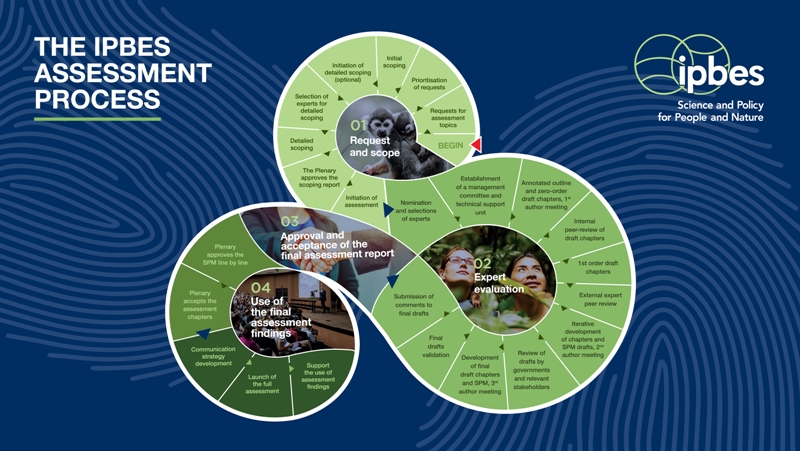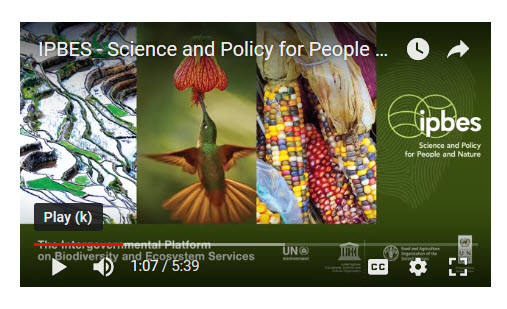IPBES, Biodiversity and Extinction: Difference between revisions
Siterunner (talk | contribs) No edit summary |
Siterunner (talk | contribs) No edit summary |
||
| Line 11: | Line 11: | ||
• ''https://www.ipbes.net/sites/default/files/downloads/ipbes_global_assessment_primer_english.pdf'' | • ''https://www.ipbes.net/sites/default/files/downloads/ipbes_global_assessment_primer_english.pdf'' | ||
• ''https://www.greenpolicy360.net/w/Extinction'' | |||
'''''“The loss of species, ecosystems and genetic diversity is already a global and generational threat tohuman well-being. Protecting the invaluable contributions of nature to people will be the defining challenge of decades to come. Policies, efforts and actions –- at every level -- will only succeed, however, when based on the best knowledgeand evidence. This is what the IPBES Global Assessment provides.”''''' | '''''“The loss of species, ecosystems and genetic diversity is already a global and generational threat tohuman well-being. Protecting the invaluable contributions of nature to people will be the defining challenge of decades to come. Policies, efforts and actions –- at every level -- will only succeed, however, when based on the best knowledgeand evidence. This is what the IPBES Global Assessment provides.”''''' | ||
Revision as of 03:20, 13 May 2019
IPBES
Biodiversity Crisis
'The planet’s support systems are so stretched that we face widespread species extinctions and mass human migration unless urgent action is taken'
• https://www.ipbes.net/sites/default/files/downloads/ipbes_global_assessment_primer_english.pdf
• https://www.greenpolicy360.net/w/Extinction
“The loss of species, ecosystems and genetic diversity is already a global and generational threat tohuman well-being. Protecting the invaluable contributions of nature to people will be the defining challenge of decades to come. Policies, efforts and actions –- at every level -- will only succeed, however, when based on the best knowledgeand evidence. This is what the IPBES Global Assessment provides.”
“We are at a crossroads. The historic and current degradation and destruction of nature undermine human well-being for current and countless future generations... Land degradation, biodiversity loss and climate change are three different faces of the same central challenge: the increasingly dangerous impact of our choices on the health of our natural environment.”
– Sir Robert Watson, IPBES Chair
Huffington Post - March 15, 2019 / The study from the Intergovernmental Science-Policy Platform On Biodiversity and Ecosystem Services (IPBES), is expected to run to over 8,000 pages, is being compiled by more than 500 experts in 50 countries. It is the greatest attempt yet to assess the state of life on Earth and will show how tens of thousands of species are at high risk of extinction, how countries are using nature at a rate that far exceeds its ability to renew itself, and how nature’s ability to contribute food and fresh water to a growing human population is being compromised in every region on earth.
Intergovernmental Science-Policy Platform On Biodiversity and Ecosystem Services
• https://www.ipbes.net/news/ipbes-global-assessment-preview
A definitive new global synthesis of the state of nature, ecosystems and nature's contributions to people — the first such report since the landmark Millennium Ecosystem Assessment published in 2005, and the first ever that is inter-governmental — will be presented to representatives of 132 Governments for consideration of approval in May 2019.
Prepared by 150 leading international experts from 50 countries, balancing representation from the natural and social sciences, with additional contributions from a further 250 experts, working with the Intergovernmental Science-Policy Platform on Biodiversity and Ecosystem Services (IPBES), the Global Assessment of Biodiversity and Ecosystem Services will inform better policies and actions in the coming decade.
The report will be discussed, finalized and considered for approval at the seventh session of the IPBES Plenary (#IPBES7), 29 April – 4 May 2019.
Three years in development, at a total cost of more than US $2.4 million, the IPBES Global Assessment draws on nearly 15,000 references, including scientific papers and government information. It is also the first global assessment ever to systematically examine and include indigenous and local knowledge, issues and priorities.
About IPBES
With 132 member Governments, the Intergovernmental Science-Policy Platform on Biodiversity and Ecosystem Services (IPBES) is the global body that assesses the state of biodiversity and nature's contributions to people, in response to requests from decision-makers, and outlines options for the future based on different socio-economic choices.
The mission of IPBES is to strengthen policy and decisions through science, for the conservation and sustainable use of biodiversity, long-term human well-being and sustainable development.
·
- Agriculture
- Anthropocene
- Biodiversity
- Biogeosciences
- Biosphere
- Business Regulations
- Climate Change
- Earth Observations
- Earth Science
- Eco-nomics
- Ecology Studies
- Economic Development
- Ecoregions
- Environmental Security
- Extinction
- Forest
- Green Politics
- Microbiology
- Microorganism
- NASA
- Natural Rights
- Nuclear Proliferation
- Nuclear Weapons
- Oceans
- Ocean Science
- Planet Citizens
- Planet Citizens, Planet Scientists
- Seventh Generation Sustainability
- Soil
- Strategic Demands
- Sustainability
- Water
- Whole Earth
- Wildlife
- Zoology

